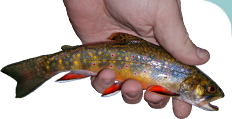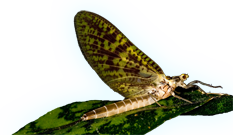Blog & Latest Updates
Fly Fishing Articles
Insects by Common Name


> > A Nymph Question (Oh My God)!
| Feathers5 | April 1st, 2015, 9:59 am | |
| Posts: 287 | A couple weeks ago I went fishing with a buddy. My two fly rig consisted of a size 8 olive woolly bugger at the point, and a PT nymph on the dropper (the fly closest to the reel). He rigs his differently. He tied on his olive bugger and then added a small nymph to the bend of the hook as a trailer. He caught over a dozen fish and I only hooked one with my rig. Question: Do you think the method he used induced more takes? | |
| Wbranch | April 1st, 2015, 10:38 am | |
| York & Starlight PA Posts: 2733 | I have never analyzed what position is better however I have always tied the larger fly on first and then tied a smaller fly onto the bend of the hook. Before I started attaching the second fly to the bend of the hook I would add a tippet with a 6" long tag end and tie the larger nymph or streamer there and the smaller fly at the end of the tippet. From what I've read about Czech nymphing the heavier, and therefore possibly the larger fly, goes on the bottom. | |
| Catskill fly fisher for fifty-five years. | ||
| Entoman | April 1st, 2015, 10:43 am | |
| Northern CA & ID Posts: 2604 | Probably. The idea behind your friends rig is that often the streamer will move the fish but not necessarily get them to take. The little trailing nymph often breaks down their shyness. Your rig wasn't offering that opportunity as rejection of the bugger usually occurs behind it, not in front where your nymph was. Like Matt, I tie the bigger fly first when attaching the dropper to the bend and reverse that when employing droppers off the leader. This convention is mostly followed for utility as they tend to tangle less. A little fly with a big bugger off the bend sounds like an invitation to bird nest land..;) | |
| "It's not that I find fishing so important, it's just that I find all other endeavors of Man equally unimportant... And not nearly as much fun!" Robert Traver, Anatomy of a Fisherman | ||
| Martinlf | April 1st, 2015, 4:10 pm | |
Moderator Palmyra PAPosts: 3233 | What works best probably depends on the conditions. I was using a Czech nymph rig one day, with two equally heavy mayfly imitation nymphs tied inline. Most fish took the upper fly. This may have been due to an impending sulphur hatch that had the fish looking up more, not focusing on the point nymph bouncing along the bottom. I suspect had I been fishing with a heavier "anchor" fly on point, and a weightless nymph in the upper position the results would have been similar. Typically, especially lately for no clear reason to me, I've often been using a heavier, larger nymph in the upper position, dropping a smaller, lighter nymph from the bend as the point fly. Kurt explains one reason this may work--when it does. Another rig I like during a hatch, often with Isos, is a heavy nymph on point, and an Iso wet fly on a separate dropper. I'll often move them a bit. Fish take both. And I don't recall all that many tangles with an open loop. I'm sure different folks get different mileage from different approaches on different days. Such is trout fishing. | |
| "He spread them a yard and a half. 'And every one that got away is this big.'" --Fred Chappell | ||
| Lastchance | April 1st, 2015, 5:50 pm | |
| Portage, PA Posts: 437 | Thanks, guys. Something for me to think about. | |
| Motrout | April 2nd, 2015, 4:39 pm | |
| Posts: 319 | Yeah, I always go big fly first with the smaller nymph as a "trailer". It seems to work fine most of the time. The first (larger) fly usually ends up being glorified split shot with the dropper getting 90% of the takes. But that may be more reflective of the spring creeks I fish than anything else. | |
| "I don't know what fly fishing teaches us, but I think it's something we need to know."-John Gierach http://fishingintheozarks.blogspot.com/ | ||
| Parsond | April 9th, 2015, 10:30 am | |
| Green River Wyoming Posts: 9 | Hey everyone. I am new to this forum and here is my first post/response. I always do the larger fly first with the smaller bugs off the bend for a number of reasons... #1 - Casting is easier and more accurate #2 - The big bug in front works as weight so I don't have to use shot as often. Shot can suck as it can spook fish, or conversely they eat it and then spook when you set. #3 - the big bug works to attract attention. Even if they don't hit it they notice it, similar to running a Hopper/Dropper combo. #4 - The largest fish of the day is typically on the big bug. It may be the only trout to eat the front fly all day but he is often the best one. -Dan | |
| Feathers5 | April 9th, 2015, 10:39 am | |
| Posts: 287 | Hey everyone. I am new to this forum and here is my first post/response. Thank for your insight, Dan. Welcome to the forum. | |
Quick Reply
You have to be logged in to post on the forum. It's this easy:
Related Discussions
| Title | Replies | Last Reply |
| Re: midges vs. gnats In the True Fly Family Chironomidae by CaseyP | 3 | Dec 22, 2007 by Martinlf |
| Re: an introduction In General Discussion by Redband | 7 | Feb 16, 2007 by Sirhoops23 |
| Re: Using a droper nymph In Beginner Help by Stokes | 6 | Feb 13, 2014 by Stokes |
| Re: Nymph and Dry Fly Rigs In General Discussion by Hellgramite | 4 | Jan 6, 2010 by Cdcaddis18 |
| Re: Foul-Hooked! In General Discussion by Chris_3g | 4 | Nov 26, 2008 by Chris_3g |
| Gills In General Discussion by Wbranch | 0 | |
| Re: fishin with salamanders In the Amphibian Order Caudata by Warren | 6 | Sep 16, 2007 by Warren |
| Re: Great hopper fishing In Fishing Reports by Motrout | 5 | Aug 27, 2010 by PaulRoberts |
| Re: Frustrated In General Discussion by David82nd | 2 | May 31, 2017 by David82nd |
| Re: Fly Boxes In the Photography Board by Wbranch | 7 | Feb 14, 2013 by Jmd123 |
Troutnut.com is copyright © 2004-2024 Jason
Neuswanger (email Jason). See my FAQ for information about use of my images.
 privacy policy
privacy policy





